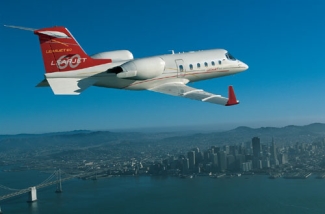The Virgin group established an Internet charter flight-booking portal last June with the take-off of Virgin Charter. The program's invitation-only beta version will expand this year to connect all interested travelers to private aircraft charter operators.
CEO Scott Duffy, a former employee of Blue Star Jets, joined Virgin Group's Sir Richard Branson to provide a centralized marketplace for private aviation charters and brought in a team of experts in the field, including executives from Google, Expedia, eBay and the Jet Propulsion Laboratory to get the idea off the ground.
 The technology behind the Virgin Charter online booking system comes from engineers at NASA and Google and will be tweaked based on user feedback. Virgin doesn't actually own or operate any jets, instead the company serves as a matchmaker for travelers and providers and seeks to streamline the chartering process by putting all the tools at travelers' fingertips.
The technology behind the Virgin Charter online booking system comes from engineers at NASA and Google and will be tweaked based on user feedback. Virgin doesn't actually own or operate any jets, instead the company serves as a matchmaker for travelers and providers and seeks to streamline the chartering process by putting all the tools at travelers' fingertips.
To purchase a charter trip, invited buyers post a specific trip request and use the site to search for available aircraft to get them there. Buyers and providers use the web site to negotiate prices online. Charter flight providers pay a fee to Virgin Charter for every trip they sell through the online marketplace.
Buyers can browse available charter options, submit requests and receive quotes free of charge, and are charged a Virgin Charter service fee only when actually purchasing a flight. The fee is a percentage of the cost of the flight.
Though Virgin Charter will not be the first website to connect charter buyers with the approximate 2,500 charter aircraft operators in the United States, it strives to be the most comprehensive, competing with companies such as Blue Star Jets and AirCharter.com.
Virgin Charter leaders hope to reduce the cost of private flights by offering buyers access to "empty legs," the return flights that private jets fly without passengers. An estimated 40% of private flights are flown without passengers because they are flying to a different city for another trip or have dropped off passengers and are heading back to their base. Virgin Charter will make information on such flights available online, increasing the possibility that they will be booked by travelers.
Virgin Charter sees these "empty legs" sales as a way to go green and diminish the amount of fuel needlessly used by private planes.
With the increasing popularity of private flying, such as air taxis, it seems as though Virgin Charter is positioned to successfully achieve its mission of making private chartering easier for consumers and more lucrative for operators.
While Virgin Charter's lofty goal of making the aviation industry just a little greener is honorable, it may not be attainable. Certainly if the empty legs are filled with people who would otherwise charter their own plane, then this will cut down on carbon emissions, but if overall it helps make private flying more popular it will have the opposite effect.
With the Virgin name attached, and with its other success in aviation, this is certainly a company to watch in 2008.
Update: Virgin Charter closed operations in October 2009.

